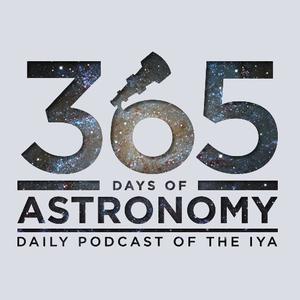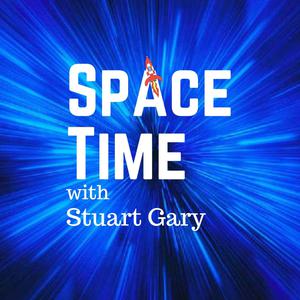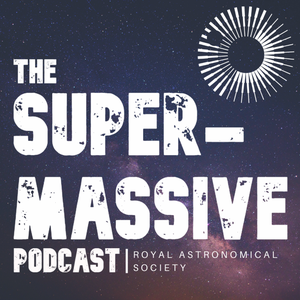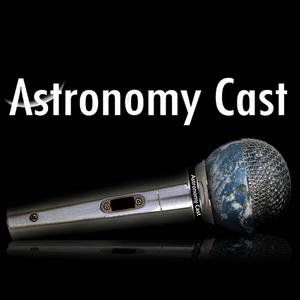
The 365 Days of Astronomy
365DaysOfAstronomy.org
- 29 minutes 57 secondsAstronomy Cast Ep. 717: Understanding the Ages of Distant Cosmic Objects
https://www.youtube.com/watch?v=MWA3OUyQQIQ
Streamed live on Apr 22, 2024.
How old is that star? That planet? That nebula? Figuring out the ages of astronomical objects is surprisingly challenging. Fortunately, astronomers have developed a series of techniques they can use to work out the ages of stuff.
This video was made possible by the following Patreon members:
Jordan Young
BogieNet
Stephen Veit
Jeanette Wink
Siggi Kemmler
Andrew Poelstra
Brian Cagle
David Truog
Ed
David
Gerhard Schwarzer
THANK YOU! - Fraser and Dr. Pamela
We've added a new way to donate to 365 Days of Astronomy to support editing, hosting, and production costs.
Just visit: https://www.patreon.com/365DaysOfAstronomy and donate as much as you can!
Share the podcast with your friends and send the Patreon link to them too!
Every bit helps! Thank you!
------------------------------------
Do go visit http://www.redbubble.com/people/CosmoQuestX/shop for cool Astronomy Cast and CosmoQuest t-shirts, coffee mugs and other awesomeness!
http://cosmoquest.org/Donate This show is made possible through your donations.
Thank you! (Haven't donated? It's not too late! Just click!)
------------------------------------
The 365 Days of Astronomy Podcast is produced by the Planetary Science Institute. http://www.psi.edu
Visit us on the web at 365DaysOfAstronomy.org or email us at [email protected].
29 April 2024, 11:00 am - 5 minutes 30 secondsTravelers in the Night Eps. 725 & 726: Mtn Ops & Close Space Rocks
Dr. Al Grauer hosts. Dr. Albert D. Grauer ( @Nmcanopus ) is an observational asteroid hunting astronomer. Dr. Grauer retired from the University of Arkansas at Little Rock in 2006. travelersinthenight.org
Today's 2 topics:
- My team, the Catalina Sky Survey, would not find a single asteroid without Steward Observatory's Mount Lemmon Operations, or Mtn Ops for short. Bottom line is that Mtn Ops does whatever it takes to make our Asteroid Hunting facilities continue to function.
- Since 1900 there have been 11 close approaches by asteroids larger than 300 feet in diameter. One of them, the Tunguska Object was about 400 feet in diameter. It entered the Earth's atmosphere and exploded with such force that it blew down trees over an 800 square mile area in 1908. Hopefully that will not happen again anytime soon.
We've added a new way to donate to 365 Days of Astronomy to support editing, hosting, and production costs.
Just visit: https://www.patreon.com/365DaysOfAstronomy and donate as much as you can!
Share the podcast with your friends and send the Patreon link to them too!
Every bit helps! Thank you!
------------------------------------
Do go visit http://www.redbubble.com/people/CosmoQuestX/shop for cool Astronomy Cast and CosmoQuest t-shirts, coffee mugs and other awesomeness!
http://cosmoquest.org/Donate This show is made possible through your donations.
Thank you! (Haven't donated? It's not too late! Just click!)
------------------------------------
The 365 Days of Astronomy Podcast is produced by the Planetary Science Institute. http://www.psi.edu
Visit us on the web at 365DaysOfAstronomy.org or email us at [email protected].
28 April 2024, 11:00 am - 39 minutes 6 secondsThe Cosmic Savannah - Ep 56: Our Supermassive Black Hole
Hosted by Dr. Jacinta Delhaize & Dr. Daniel Cunnama.
The Event Horizon Telescope (EHT) Collaboration has unveiled the first image of the supermassive black hole at the centre of our own Milky Way galaxy! This is the first direct evidence of the black hole in our galaxy. The image was produced by a global research team called the EHT Collaboration, using observations from a worldwide network of radio telescopes.
We are joined by Dr. Iniyan Natarajan who is a postdoctoral fellow at the University of Witwatersrand and who was part of the team of over 300 astronomers who made this possible.
EHT Press Release:
https://eventhorizontelescope.org/blog/astronomers-reveal-first-image-black-hole-heart-our-galaxy
We've added a new way to donate to 365 Days of Astronomy to support editing, hosting, and production costs.
Just visit: https://www.patreon.com/365DaysOfAstronomy and donate as much as you can!
Share the podcast with your friends and send the Patreon link to them too!
Every bit helps! Thank you!
------------------------------------
Do go visit http://www.redbubble.com/people/CosmoQuestX/shop for cool Astronomy Cast and CosmoQuest t-shirts, coffee mugs and other awesomeness!
http://cosmoquest.org/Donate This show is made possible through your donations.
Thank you! (Haven't donated? It's not too late! Just click!)
------------------------------------
The 365 Days of Astronomy Podcast is produced by the Planetary Science Institute. http://www.psi.edu
Visit us on the web at 365DaysOfAstronomy.org or email us at [email protected].
27 April 2024, 11:00 am - 20 minutes 49 secondsEVSN - An In-Depth Look at the Hunga Tonga-Hunga Ha’apai Eruption
From January 20, 2022.
The Hunga Tonga-Hunga Ha’apai volcano in the Kingdom of Tonga erupted on January 15, and despite communications being cut off, government officials and scientists have gathered a wealth of information about the event and its outcome so far. Plus, urban heat islands, volcanic lightning, and What’s Up.
We've added a new way to donate to 365 Days of Astronomy to support editing, hosting, and production costs.
Just visit: https://www.patreon.com/365DaysOfAstronomy and donate as much as you can!
Share the podcast with your friends and send the Patreon link to them too!
Every bit helps! Thank you!
------------------------------------
Do go visit http://www.redbubble.com/people/CosmoQuestX/shop for cool Astronomy Cast and CosmoQuest t-shirts, coffee mugs and other awesomeness!
http://cosmoquest.org/Donate This show is made possible through your donations.
Thank you! (Haven't donated? It's not too late! Just click!)
------------------------------------
The 365 Days of Astronomy Podcast is produced by the Planetary Science Institute. http://www.psi.edu
Visit us on the web at 365DaysOfAstronomy.org or email us at [email protected].
26 April 2024, 11:00 am - 7 minutes 3 secondsAwesome Astronomy - Why Is The Moon Upside Down?
https://www.youtube.com/watch?v=PSInnKa4ODE
Paul Hill, Ralph Wilkins and Dr. Jenifer “Dr. Dust” Millard host.
Damien Phillips, John Wildridge and Dustin Ruoff produce.
But really it’s all just a big Ralph Fest today!
From Mar 25, 2022.
If you’ve never been to the southern hemisphere (or the northern hemisphere, if you live in the southern hemisphere), you might not be aware that the moon and the constellations appear upside down!
In this episode we’ll show you how that appears, why, and how that proves the Earth isn’t flat - as if any more proof were needed!
We've added a new way to donate to 365 Days of Astronomy to support editing, hosting, and production costs.
Just visit: https://www.patreon.com/365DaysOfAstronomy and donate as much as you can!
Share the podcast with your friends and send the Patreon link to them too!
Every bit helps! Thank you!
------------------------------------
Do go visit http://www.redbubble.com/people/CosmoQuestX/shop for cool Astronomy Cast and CosmoQuest t-shirts, coffee mugs and other awesomeness!
http://cosmoquest.org/Donate This show is made possible through your donations.
Thank you! (Haven't donated? It's not too late! Just click!)
------------------------------------
The 365 Days of Astronomy Podcast is produced by the Planetary Science Institute. http://www.psi.edu
Visit us on the web at 365DaysOfAstronomy.org or email us at [email protected].
25 April 2024, 11:00 am - 50 minutes 14 secondsSETI Live - SETI Artist In Residence Program: Xin Liu’s Inward Expeditions
Nimbly combining the tools of art and science, SETI Institute Artist in Residence Xin Liu expresses what it means to be human through a diverse body of work that includes frost-coated sculptures, a bubbling fountain of crude oil, and a performance in outer space.
In a new body of sculptures exhibited at Pioneer Works in New York City, the artist considers her fears around having her eggs frozen, creating warped, skeletal, frost-covered sculptures that propose a human body transformed through a cryogenic process. Through art, Liu centers the human experience in the face of technologies and developments motivated by efficiency, productivity, and optimization.
Art21 is the world’s leading source to learn directly from the artists of our time. A nonprofit organization, the mission of Art21 is to educate and expand access to contemporary art, producing documentary films, resources, and public programs. Learn more at http://Art21.org
Join SETI Artist in Residence Program Director Bettina Forget as she chats with Emma Nordin from Art21, premieres Xin Liu's video, and then speaks with her about this latest show and its scientific concepts.
We've added a new way to donate to 365 Days of Astronomy to support editing, hosting, and production costs.
Just visit: https://www.patreon.com/365DaysOfAstronomy and donate as much as you can!
Share the podcast with your friends and send the Patreon link to them too!
Every bit helps! Thank you!
------------------------------------
Do go visit http://www.redbubble.com/people/CosmoQuestX/shop for cool Astronomy Cast and CosmoQuest t-shirts, coffee mugs and other awesomeness!
http://cosmoquest.org/Donate This show is made possible through your donations.
Thank you! (Haven't donated? It's not too late! Just click!)
------------------------------------
The 365 Days of Astronomy Podcast is produced by the Planetary Science Institute. http://www.psi.edu
Visit us on the web at 365DaysOfAstronomy.org or email us at [email protected].
24 April 2024, 11:00 am - 6 minutes 5 secondsExoplanet Radio - Ep 16: How Long To Travel to The Closest Exoplanet Proxima Centauri b?
Many people feel that it’s very important for humanity’s long term survival that we become a multiplanet species. Traveling to and possibly even inhabiting other planets in our solar system is not only possible with our current levels of technology, but compared to going to the stars, it’s downright easy.
But what about traveling to exoplanets? Can we reach the stars?
We've added a new way to donate to 365 Days of Astronomy to support editing, hosting, and production costs.
Just visit: https://www.patreon.com/365DaysOfAstronomy and donate as much as you can!
Share the podcast with your friends and send the Patreon link to them too!
Every bit helps! Thank you!
------------------------------------
Do go visit http://www.redbubble.com/people/CosmoQuestX/shop for cool Astronomy Cast and CosmoQuest t-shirts, coffee mugs and other awesomeness!
http://cosmoquest.org/Donate This show is made possible through your donations.
Thank you! (Haven't donated? It's not too late! Just click!)
------------------------------------
The 365 Days of Astronomy Podcast is produced by the Planetary Science Institute. http://www.psi.edu
Visit us on the web at 365DaysOfAstronomy.org or email us at [email protected].
23 April 2024, 11:00 am - 29 minutes 10 secondsAstronomy Cast Ep. 716 - The God**** Particle - Remembering Peter Higgs
https://www.youtube.com/watch?v=KaZEiNaz2CQ
Streamed live on Apr 15, 2024.
Last week, we learned about the death of Peter Higgs, a physicist and discoverer of the particle that bears his name. The Large Hadron Collider was built to find and describe the particle. Today, we’ll look back at the life of Peter Higgs and his particle.
This video was made possible by the following Patreon members:
Jordan Young
BogieNet
Stephen Veit
Jeanette Wink
Siggi Kemmler
Andrew Poelstra
Brian Cagle
David Truog
Ed
David
Gerhard Schwarzer
THANK YOU! - Fraser and Dr. Pamela
We've added a new way to donate to 365 Days of Astronomy to support editing, hosting, and production costs.
Just visit: https://www.patreon.com/365DaysOfAstronomy and donate as much as you can!
Share the podcast with your friends and send the Patreon link to them too!
Every bit helps! Thank you!
------------------------------------
Do go visit http://www.redbubble.com/people/CosmoQuestX/shop for cool Astronomy Cast and CosmoQuest t-shirts, coffee mugs and other awesomeness!
http://cosmoquest.org/Donate This show is made possible through your donations.
Thank you! (Haven't donated? It's not too late! Just click!)
------------------------------------
The 365 Days of Astronomy Podcast is produced by the Planetary Science Institute. http://www.psi.edu
Visit us on the web at 365DaysOfAstronomy.org or email us at [email protected].
22 April 2024, 11:00 am - 5 minutes 30 secondsTravelers in the Night Eps. 271 & 272: Dark Trails & Mars Impactor
Dr. Al Grauer hosts. Dr. Albert D. Grauer ( @Nmcanopus ) is an observational asteroid hunting astronomer. Dr. Grauer retired from the University of Arkansas at Little Rock in 2006. travelersinthenight.org
Today's 2 topics:
- A faint shooting star or meteor streaking across the sky is produced when a tiny bit of rock or dust enters the Earth's atmosphere and burns up some 60 miles above us. NASA scientist Dr. Marc Fries and his collaborators have used Doppler Weather Radar to track twenty meteor's dark trails through the sky. In the past year or so they have used this technique to direct searchers on the ground to the probable location of freshly fallen meteorites.
- In 2015 the Earth was struck by at least 43 meteoroids which created bright fireballs. Their arrival does not seem to be correlated with the position of the Earth in it's orbit about the Sun.Overall a given piece of ground on Mars is several times more likely to be hit by a space rock than is a similar sized area on Earth.
We've added a new way to donate to 365 Days of Astronomy to support editing, hosting, and production costs.
Just visit: https://www.patreon.com/365DaysOfAstronomy and donate as much as you can!
Share the podcast with your friends and send the Patreon link to them too!
Every bit helps! Thank you!
------------------------------------
Do go visit http://www.redbubble.com/people/CosmoQuestX/shop for cool Astronomy Cast and CosmoQuest t-shirts, coffee mugs and other awesomeness!
http://cosmoquest.org/Donate This show is made possible through your donations.
Thank you! (Haven't donated? It's not too late! Just click!)
------------------------------------
The 365 Days of Astronomy Podcast is produced by the Planetary Science Institute. http://www.psi.edu
Visit us on the web at 365DaysOfAstronomy.org or email us at [email protected].
21 April 2024, 11:00 am - 36 minutes 1 secondDeep Astronomy - DwarfLab Dwarf 2 Smart Telescope
https://www.youtube.com/watch?v=gzlJ9yzki08
The Beginner's Gateway to the Cosmos, Even in the City!
From Sep 28, 2023.
Here is the Deep Astronomy Review of the Dwarf II smart telescope from Dwarflabs.
If you're looking to buy one, here's my affiliate link:
https://dwarflab.com/products/dwarf-2-smart-telescope?aff=43
We've added a new way to donate to 365 Days of Astronomy to support editing, hosting, and production costs.
Just visit: https://www.patreon.com/365DaysOfAstronomy and donate as much as you can!
Share the podcast with your friends and send the Patreon link to them too!
Every bit helps! Thank you!
------------------------------------
Do go visit http://www.redbubble.com/people/CosmoQuestX/shop for cool Astronomy Cast and CosmoQuest t-shirts, coffee mugs and other awesomeness!
http://cosmoquest.org/Donate This show is made possible through your donations.
Thank you! (Haven't donated? It's not too late! Just click!)
------------------------------------
The 365 Days of Astronomy Podcast is produced by the Planetary Science Institute. http://www.psi.edu
Visit us on the web at 365DaysOfAstronomy.org or email us at [email protected].
20 April 2024, 11:00 am - 31 minutes 17 secondsEVSN - Following the Water Toward Climate Change
From April 10, 2024.
This week’s episode is brought to you by last week’s terrible weather. While experiencing hail and thunder IRL, we also saw press release after press release and article after article discussing climate change. This one-two punch of new science and the need for a new roof means we will touch on climate change in our closer look this week. We apologize in advance; it’s not pretty out there -- unless you like storm chasing, then it’s kind of the stuff of dreams at the moment.
We've added a new way to donate to 365 Days of Astronomy to support editing, hosting, and production costs.
Just visit: https://www.patreon.com/365DaysOfAstronomy and donate as much as you can!
Share the podcast with your friends and send the Patreon link to them too!
Every bit helps! Thank you!
------------------------------------
Do go visit http://www.redbubble.com/people/CosmoQuestX/shop for cool Astronomy Cast and CosmoQuest t-shirts, coffee mugs and other awesomeness!
http://cosmoquest.org/Donate This show is made possible through your donations.
Thank you! (Haven't donated? It's not too late! Just click!)
------------------------------------
The 365 Days of Astronomy Podcast is produced by the Planetary Science Institute. http://www.psi.edu
Visit us on the web at 365DaysOfAstronomy.org or email us at [email protected].
19 April 2024, 11:00 am - More Episodes? Get the App
Your feedback is valuable to us. Should you encounter any bugs, glitches, lack of functionality or other problems, please email us on [email protected] or join Moon.FM Telegram Group where you can talk directly to the dev team who are happy to answer any queries.
 Space Nuts
Space Nuts
 SpaceTime with Stuart Gary
SpaceTime with Stuart Gary
 The Supermassive Podcast
The Supermassive Podcast
 Astronomy Cast
Astronomy Cast
 Universe Today Podcast
Universe Today Podcast
 Ask a Spaceman!
Ask a Spaceman!